Introducing a new series of essays about science fiction TV series that, while popular with viewers, were cancelled early on by the networks. Some of the programs to be covered include Moonlight (2007-8), Almost Human (2013-4), and the U.S. version of Life on Mars (2008-9).
The 2005 science fiction TV series Threshold gives an inventive twist to the extraterrestrial invasion theme. The aliens try to take over the world all right, but they do it by proxy: they transform humans on a molecular level to become them. Along with that intriguing premise, the series attracted fans with its special effects and the gripping suspense of the first episode’s opening scenes, as well as the cadre of actors brought in as series regulars.
But as an astute fan of Threshold commented: “Threshold was part of the rarest of all phenomenon: three new Sci-fi shows debuting at the same time on all three major networks. CBS had Threshold, ABC had Invasion, and NBC had Surface. Of the three, Threshold had the best pilot episode and the best cast in my opinion, but unfortunately it wasn’t able to build upon the creepiness of the pilot and subsequently was the first of the three to be canceled.”
The series began on Friday nights on CBS in September 2005. Created by Executive Producer Bragi F. Schut, it was co-produced by Brannon Braga, David S. Goyer, and David Heyman. After it was switched from Friday nights to Tuesday nights to try to boost ratings, CBS cancelled the series on November 23rd of that year, when four of its completed thirteen episodes had not been aired. The whole series was later released on DVD, and aired in its entirety on the Sci Fi Channel. So what went wrong?
While Threshold explores an age-old theme that hearkens back to H.G. Wells’ 1897 novel The War of the Worlds, it advances a relatively new concept: genetically engineering the human race so that people are transformed into the alien lifeform. We become the alien.
In the first episode, Part One of a two-part story entitled “Trees Made of Glass,” crewmen aboard a freighter, the M.S.C. Big Horn, somewhere in the North Atlantic, are enjoying a quiet night on tranquil waters. The first mate is talking to his captain on the bridge when they hear an eerie sound that cuts through the stillness. The ship begins to crack and pieces fall like plaster. The sharp-edged sound becomes stronger. The region in front of them seems to explode with brightness. A crystalline object hovers in the air beside the ship. The object is in motion, folding on itself, so that it doesn’t take any single defined shape. Drawn to it, the members of the crew gather on the port side to watch. The crewmen wince as the high-pitched sound hurts their ears. They’re unable to take the pain…
That opening scene is filled with mystery and chilling moments of suspense. What follows in that first hour is a fast-paced gathering of a special team of scientists bent on learning what happened to the crew of the Big Horn and studying the effects caused by this visitation.
The scene shifts to Dr. Molly Caffrey (played by Carla Gugino), a government crisis management consultant, as she is talking about global pandemics in a lecture hall of the Blackwood Institute in Richmond, Virginia. That night, she is picked up by military helicopter and brought to Washington, D.C. She is briefed about the government sighting of a UFO that had entered earth’s atmosphere and had made course corrections, indicating that it was under intelligent control. At a conference of high-level government officials, Dr. Caffrey meets J.T. Baylock (played by Charles S. Dutton), Deputy National Security Adviser, who is assigned to head the new project. This project is formed from one of Dr. Caffrey’s contingency plans; the plan she had named Threshold.
Three highly-qualified men are snatched up in the night and briefed as they are brought to Washington. They are Dr. Nigel Fenway (Brent Spiner), a medical pathologist and microbiologist; Lucas Pegg (Rob Benedict), an aerospace engineer; and Arthur Ramsey (Peter Dinklage), an expert in applied mathematics and linguistics. Peter Dinklage is certainly known to fans of HBO’s Game of Thrones as Tyrion Lannister. In Threshold, he similarly plays Ramsey as a gregarious womanizer. Witness this exchange with Molly Caffrey:
Caffrey: Ramsey, I need to tap your expertise.
Ramsey: Well, I knew you would eventually. The answer is yes.
Caffrey: Excuse me?
Ramsey: Women always come to me for sexual release like I’m some machine.
Caffrey: I was referring to your language skills.
Ramsey: Your loss.
Rob Benedict had appeared on television’s Supernatural and Buffy the Vampire Slayer before he was cast as Lucas Pegg. Lucas is on the verge of getting married and is uneasy about his role with the “Red Team.” To my thinking, Benedict’s thready voice and nervous behavior make the portrayal of Lucas rather weak and ineffectual. But I find myself proven wrong when Lucas suffers from the alien infection in episode 11, “Outbreak.” He becomes an important focus in that episode and exhibits a quiet courage that redeems his character for me. His seeming weakness earlier makes him all the more sympathetic, even heroic, in “Outbreak.”
Brent Spiner’s Dr. Fenway is unlike the ingenuous Data of Star Trek: The Next Generation. Fenway is an acid-tongued cynic who argues that Dr. Caffrey’s protocols are flawed. He believes that the alien threat should be made public so it can be resolved quickly.
The camaraderie between Lucas, Fenway, and Ramsey provides the series with a levity that adds to the roundness of these characters who must face a serious threat. Their character back stories become part of the high points in dealing with the alien infection and their personal concerns are interwoven into the series’ story arc.
Along with Dr. Caffrey and a military unit, Fenway, Lucas, and Ramsey are sent to the freighter Big Horn. They find most of the crew dead, their features horribly deformed. They also discover one man alive, the first mate, Gunneson (played by William Mapother).
Gunneson becomes the first living representative we see of a human whose DNA is transformed into that of an alien. He and six missing crewmen of the Big Horn had been changed at the molecular level, their body chemistry showing a fractal triskelion pattern, as does most of the instrument panels on the freighter. Instead of a double helix, their DNA has a triple helix.
Dr. Caffrey, Lucas Pegg, and Sean Cavenaugh (Brian Van Holt), the head of the military team assigned to Threshold, watch a video made by a crewman on the ship. When the filmed view of the probe comes on, they are immediately affected by the emitted sound, causing nose bleeds and pain. Their exposure to this signal becomes critical to the larger story arc.
When the North Koreans send a submarine toward the Big Horn, Dr. Caffrey and her “Red Team” are forced to abandon the site. Cavenaugh is ordered to place explosives on the Big Horn and sink it. In their evacuation, the semiconscious Gunneson fights them off with superhuman strength and gets away. During his escape, he reveals not only great strength, but also endurance, miraculous healing powers, resistance to the deadly effects of bullets, and highly developed athletic prowess—all due to the improvements of alien DNA.
Back in Washington, Dr. Fenway confers with Caffrey and Cavenaugh about his medical findings. “I picked up some unusual activity in your mid to upper frontal lobes,” Fenway tells them. “Both of you. Lucas, too.… We’re talking brain wave activity.… These are theta waves. You’re all generating far more than the average cognitive model.” Caffrey asks, “You’re saying that watching the video changed the way we think?” Fenway responds, “Maybe.” Theta waves are part of real science. Occurring at a frequency of about four to eight hertz on an electroencephalogram, they are connected to memory and navigation functions in the human brain. So, there is a scientific rationale behind changes that occur in those influenced by the alien video.
The episode concludes with Caffrey dreaming of being in a landscape of glass trees. The setting is unique enough so that we can believe we are seeing the aliens’ planet. Memory, you see, caused by changes in theta waves. Dr. Caffrey is viewing new memories—alien memories. The dream also becomes a motif that haunts others who have been exposed to the extraterrestrial signal.
Part two of the pilot focuses largely on First Mate Gunneson, who, having escaped from the Big Horn, makes it to land and finds his way to Molly Caffrey’s home.
Film director Peter Hyams, who directed “Trees Made of Glass, Part Two,” grips the viewer in scenes of genuine suspense. Using a script by series creator Schut and David S. Goyer, Hyams develops moments of real terror when Fenway, Ramsey, and Lucas watch for Gunneson in a van at night. Lucas leaves the van to check on the audio signal they are transmitting. Gunneson suddenly appears directly in front of him and speaks with cool deliberation:
“We’re connected, you and I, did you know that? All of us are. We’re drawn to each other. We can’t help it. God created man in his image. This is no different. You want to scream for your friends? Go ahead. Scream all you want to. Scream!”
Gunneson is captured by Cavenaugh and his squad, and, rather than being killed, the first mate is detained in Fenway’s laboratory. He is the first of the transformed “infectees” to be captured by Caffrey and the Red Team. As further episodes show, these infectees are kept in cells in the lower level of the Threshold Command Center in the heart of Washington, D.C., blocks away from the White House, where they can be interrogated and studied. And yes, that becomes an issue in a later episode.
What may seem at first glance to be an “alien-of-the-week” storyline is really much more thought out. Each of the succeeding episodes of Threshold builds on the last as the members of the Red Team make new discoveries about the way infectees are changed. I suspect that the creative forces of the series have incorporated something very much like Stephen King’s approach to writing a story; executive producer Bragi F. Schut appears to understand the need for connectivity as his storylines proceed from episode to episode. This is very much like the process Stephen King describes.
In his nonfiction collection On Writing, King compares the telling of a story to an archaeological dig. Instead of developing a plot, which can, he writes, “feel artificial and labored,” King views stories as “found things like fossils in the ground”. Using as his example the novel Misery, King explains that he uncovered the character of Annie through an evolving complexity he (the writer) hadn’t planned on. She surprised him at every turn. “And none of the story’s details and incidents proceeded from plot; they were organic, each arising naturally from the initial situation, each an uncovered part of the fossil”.
Organic. The very word brings to my mind the image in “Trees Made of Glass, Part One” of the large beetles swarming over a dead crewman on the deck of the Big Horn and, in their scurrying, forming the fractal triskelion pattern that becomes so prevalent a symbol.
The arc of the thirteen-episode storyline begins with the incident at the Big Horn. In the story-telling process, the alien probe’s appearance at the ship is “the initial situation” from which everything else derives. If we pursue the Stephen King analogy further, the sunken ship becomes quite literally a fossil to be uncovered in episode 8, “Revelations.”
After studying a hull fragment from the Big Horn they had found in a seafood restaurant, Fenway explains, “The crystalline structures were the result of algae that was bioformed by the alien signal.” Caffrey added, “And these crystals affected people’s theta waves and gave them these nightmares.” Dreaming of a landscape of glass trees seems to be a first stage of alien influence. People are infected merely by proximity to the crystal growths from the Big Horn’s wreckage. In “Revelations,” Molly Caffrey discovers flies that are mutated by feeding on flora infected by the crystalline structures.
Fenway, Ramsey, and Lucas find the remains of the sunken ship in the Atlantic. They see that the crystalline structures cover the ship and continue to grow. Anything passing in proximity—a ship, a whale, anything—would spread the infection.
“Let’s establish a no-shipping, no-fly zone above the wreckage,” Caffrey tells her team. “Thirty miles wide at least. If we set up an unmanned monitoring station, we can keep eyes on the wreckage 24/7.” Of course, the problem isn’t solved, but it is a logical way to move on to other storylines.
In episode 5, entitled “Shock,” one of the main characters of the Red Team is directly affected by the alien DNA crisis. Lucas notices he is having difficulty with his vision and goes to Dr. Fenway. Fenway has him remove his contact lenses and read off the text on a computer monitor. Lucas’ vision has improved radically. They both realize that Lucas’ exposure to the video of the alien signal while on board the Big Horn is changing him. In episode 11, “Outbreak,” Lucas is feverish and hallucinating, his condition worsening because he had eaten infected vegetables. Fenway and Caffrey fear that Lucas will become “a full-blown alien.” “Outbreak” concludes with Fenway finding a way to halt the infection by taking a dangerous step: he reintroduces the audio signal to Lucas. The attempt proves successful. It also means they have a new method to combat the effects of the encroaching alien DNA, at least in its early stages.
Ramsey has his time of crisis in episode 10, the episode entitled “The Crossing.” He has befriended one of the military guards, Sergeant Adams. When three of the infectees held in the cells below the Threshold Headquarters make a failed escape, Adams becomes infected with the alien DNA. Restrained in Fenway’s lab, Sergeant Adams begs Caffrey to kill him before the moment he “turns” into one of them. Molly agrees. When the time comes, Ramsey takes it upon himself to give Adams the lethal injection. The usually outgoing Ramsey retreats into himself and flees to a bar. Dejected, he insists that he wants to quit Threshold. Caffrey finds him (they all have tracking devices injected into the arm) and talks him back with the point that they need him to prevent others from “turning.” He responds with the fact that, knowing what he knows, he’d rather be on the inside where he’s kept informed.
Acerbic, cynical Dr. Fenway has his crisis of conscience in episode 7, “The Order.” When a Washington, D.C. reporter publishes articles about Threshold, Fenway is accused of leaking information. Investigating, Cavenaugh and Caffrey trace the problem to a diner that Fenway goes to regularly. His usual place at the counter, where he regularly chats with the owner, has a hidden wiretap. A petty private detective named Nicky Frost (Jon Polito) had been hired by one of Fenway’s ex-wives to find out if Fenway’s new job includes an increased salary so that she could demand larger alimony payments. Frost uses Fenway’s recorded conversation for his own gain, selling details about Threshold to the reporter. The chain of events that follows leads to the death of a young woman. Devastated by her death, Fenway confronts the arrested Nicky Frost. That scene is a rare occasion for us to see Fenway’s surly side—and Brent Spiner’s intensity as an actor.
Molly Caffrey undergoes a concurrent time of crisis in the same episode. Because of the publication of classified news on Threshold, Senator Will Tollman (Kevin Kilner), Chairman of the Appropriations Committee, wants access to Threshold. The interfering senator becomes infected with the alien DNA and, in turn, infects everyone on board a flight to Los Angeles. This includes National Security Adviser Andrea Hatten (Diane Venora), who is Molly’s mentor and friend. Molly gives the order to blow up the plane in flight to prevent further spread of the alien infection. Caffrey keeps her feelings hidden as she walks away. She sits on a stone bench and answers her ringing cell phone. Emotions in check, she talks to her mother on the phone about trivial things. Carrying the weight of the world and having just killed her friend, she finds comfort in talking to her mom. And in that scene, actress Carla Gugino does something I like in an actor’s performance, she gives her character a roundness that is made of equal parts professionalism and vulnerability.
There is much that I find worthwhile about Threshold. Creator/producer Bragi F. Schut takes great care in maintaining scientific reason in a consistently building storyline from episode to episode. The regular cast of actors strives for a roundness in portraying their characters that allows for realistically poignant moments as well as exchanges of high humor. Special effects and technical aspects of filming the series, to my eye, are consistently high level. I applaud the producers for bringing in directors like Tim Matheson, who, aside from acting, has directed a host of recent and current television dramas, and Peter Hyams, director of blockbuster films like Capricorn One, Universal Soldier, and End of Days. In Threshold, we are treated to nuanced performances by guest actors like Viola Davis, playing a feisty Baltimore detective in the episode “Shock,” years before her starring role as Annalise Keating in How To Get Away with Murder, and Jeffrey Donovan as Dr. Sloan in the episode “Vigilante” a year before his starring role as Michael Weston in Burn Notice.
It leaves me with a burning question: Why would a show like Threshold, with such notable qualities, be cancelled by CBS after broadcasting only nine of its completed episodes? Could it be that it had been caught up in a competition with similar science fiction series on the other two major networks? Do you think it’s true that Threshold “wasn’t able to build upon the creepiness of the pilot”?
Can someone out there tell me: what went wrong?
Ted Krulik was born at the beginning of the television age. As a child, he watched first-run episodes of Rocky Jones, Space Ranger, starring Richard Crane, and the 1950s Flash Gordon, starring Steve Holland. A new and exciting series of the late 1960s, a little known TV show named Star Trek, filled Krulik with dreams of a someday world of aliens and remarkable technical devices. In the 1970s, Krulik attended the earliest Star Trek conventions in Manhattan. At one of these, he met George Takei, Ensign Sulu himself, who told him that Star Trek was never coming back to television except, maybe, as a new animated series. “You see,” Takei said, “all the sets have been struck; all the uniforms are gone. There’s nothing left to go back to.” Famous last words.










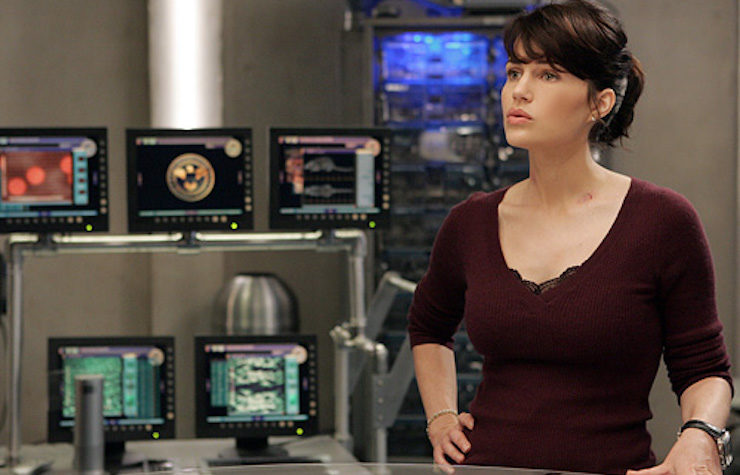
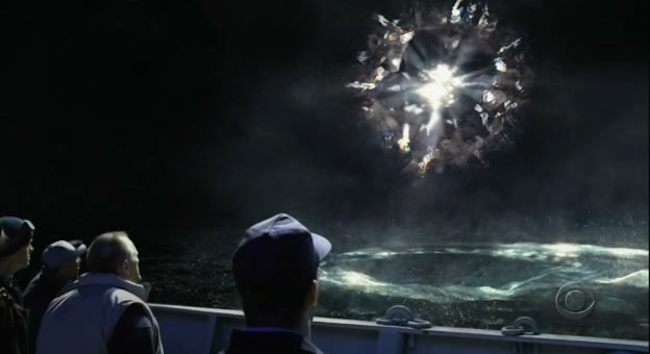
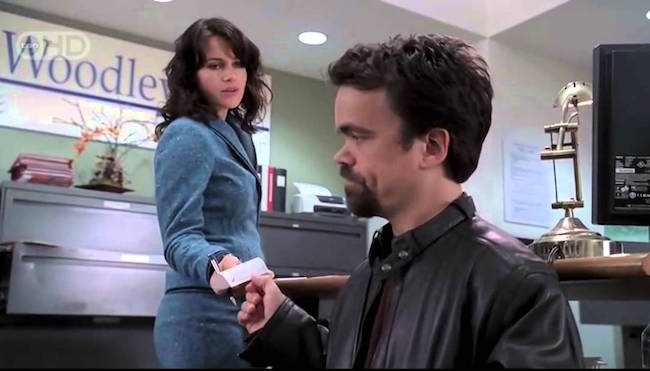
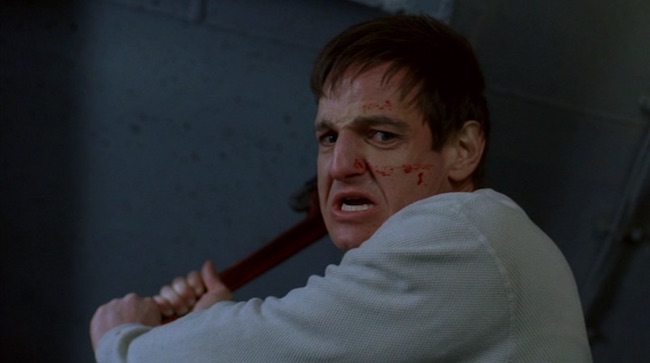
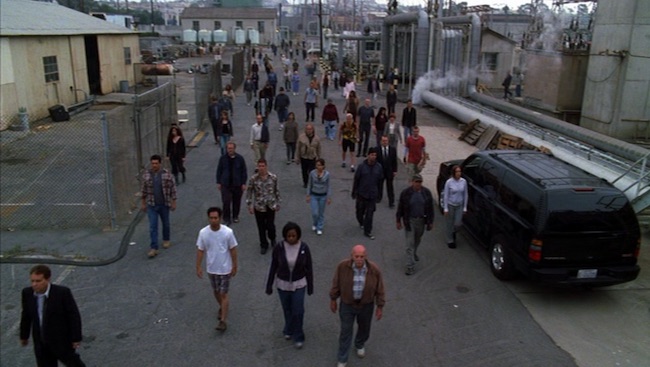
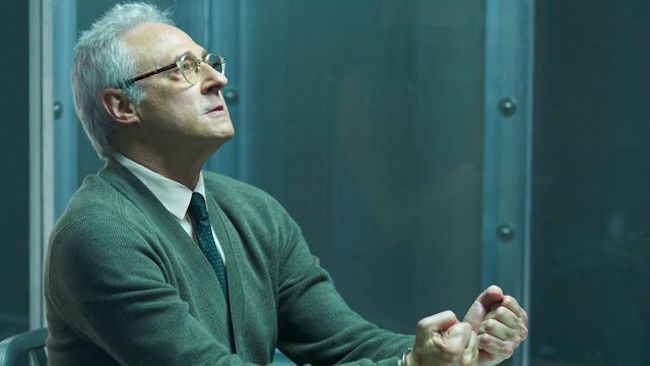
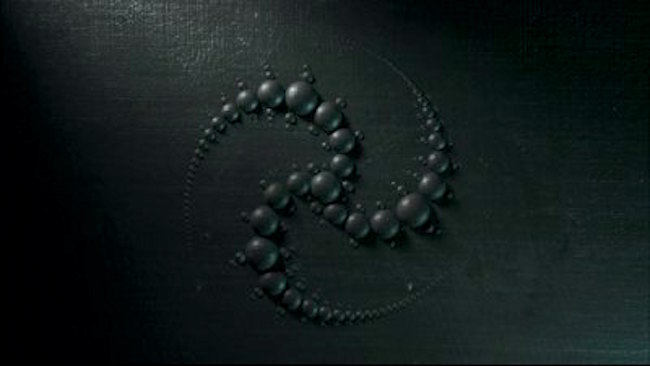
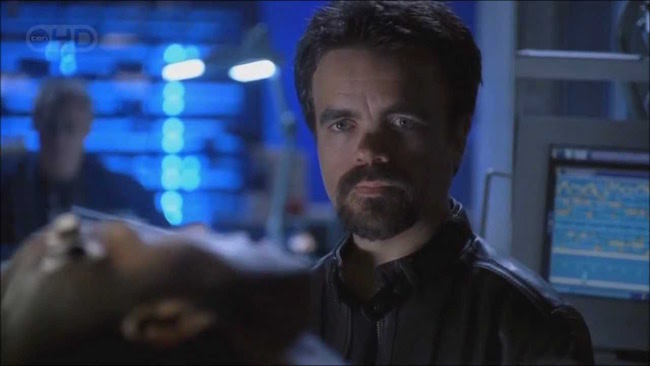
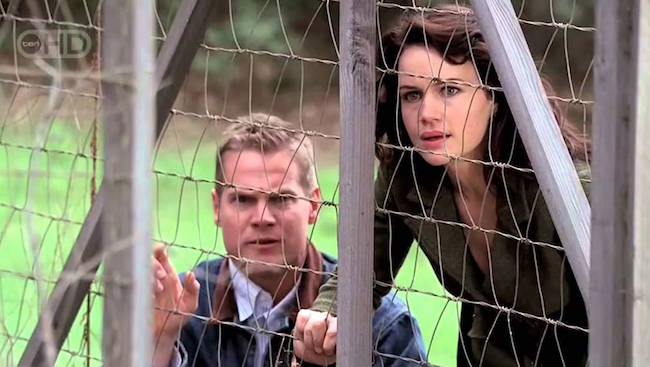
What I think happened is that the first few episodes were a bit too repetitive and seemingly case-of-the-week. The people on my online bulletin boards, at least, thus assumed the whole series would just be a formulaic, episodic show, and thus they tuned out before its serial elements started to show up. If it had been a bit less of a slow burn, it might not have lost its audience so quickly.
But then, this is one of the shows that helped me arrive at my theory about how modern TV works: Network executives and mass audiences tend to prefer comfortable, formulaic procedurals, so any show that wants to do something more creative or unusual needs to start out pretending to be an episodic procedural to avoid spooking the suits, only gradually easing into the more distinctive stuff. Threshold started with individual alien-infection cases before it started to expose the bigger arc of the coming invasion. Dollhouse started with Echo helping clients-of-the-week with their problems before it began to explore the bigger mythology about the ramifications of its mind-rewriting technology. Lucifer gave the comics character a homicide-cop partner and a case-of-the-week format, then gradually folded in bigger supernatural arc elements on top of that. Person of Interest spent a whole season on crimes-of-the-week before it even introduced the larger concepts about strong artificial intelligence, and took nearly a second whole season before really starting to explore them. Even Orphan Black started out with its lead character impersonating a cop so it’d look like a standard procedural, though it quickly abandoned that.
The problem, though, is that the more innovative and complex ideas that network suits and average viewers need to be gently eased into are the same ideas that SF/fantasy fans thrive on and want to see right up front. So there’s a tension between the two audiences. If a genre show is too episodic and formulaic to begin with, too slow to introduce the more intriguing ideas, then it can lose its target audience before it really establishes itself. That’s what happened with Threshold, Dollhouse, and Syfy’s Flash Gordon (which started out as a lame, Earthbound Smallville clone and had lost its audience by the time it embraced Mongo fully and became a far better show).
Although it seems to be happening less now, with more shows being given a chance to establish themselves before they’re cancelled. Maybe audiences have learned to have more patience — or maybe network execs have. I’ve read that networks today are getting slower to cancel shows, because the competition of outlets like Netflix and Amazon and such means that there are fewer shows available for the commercial networks, so they have fewer options for replacing a cancelled show and thus more incentive to avoid cancelling them. Threshold had the misfortune of coming along at a time when audiences and executives were both too impatient to give it a chance to establish itself.
“it advances a relatively new concept: genetically engineering the human race so that people are transformed into the alien lifeform. We become the alien.”
Nothing new about that. Many, many similar stories. Vampires and werewolves for a start; (some have been done with an SF rather than magical gloss) many “mind parasite” stories (Heinlein’s Puppet Master, e.g.); or “possession”, whether supernatural or technological. John Wyndham’s “Children of the Damned” — women in a village all give birth to alien hybrids. Octavia Butler’s Xenogenesis. Doctor Who’s Cybermen, Trek’s Borg. Zombie Apocalypse in all its variants.
On TV, aliens that become human and humans that become alien (while still looking human) are very popular, because it saves on SFX. And people react to people rather than true aliens, who we’d be lucky to be as similar to us as insects. But on TV are possibly distinguished by some bumps on the head or pointy ears. Anyway, these 99.9% human aliens are all metaphors for some kind of human the audience fears: communists, fascists, muslims, Chinese.
So I’m not really motivated to check this series out.
The “stealth procedural” also helped Fringe stay on the air for a while so it could start dropping in its serialised events as well. It’s a reasonable path to take. Clearly it didn’t help Threshold.
I think we can sum Threshold’s failure up in two words. Brannon and Braga, put ’em together and you’ve a sure fire recipe for failure.
Also the good guys were kinda fascist, even by CBS post 9/11 standards.
I can tell exactly why this show got cancelled. The show’s audience and ratings were doing okay for a Friday night time slot, but CBS wanted to boost ratings–so they claim–and moved it to Tuesdays at the same time as the wildly popular Law & Order: SVU. On it’s first, and only, airing on Tuesday Threshold went up against not only SVU but also the American Music Awards and got blasted out of the water in the ratings. The next day CBS cancelled the series because of poor ratings.
So there are two ways to look at it: Either CBS wanted to cancel the series and needed an excuse thus put it up against SVU & the AMAs on it’s first Tuesday in which there was no doubt the show’s ratings would tank; Or CBS legitimately wanted to boost ratings and for some reason thought going up against both SVU & the AMAs was a fantastic idea then couldn’t understand why the ratings tanked resulting in cancellation.
Threshold died when CBS decided to move it from Friday nights.
@4/random22: Brannon Braga’s bashers constantly assume he’s the sole creative vision behind anything he does, which is a fundamental misunderstanding of his entire career. He’s not an auteur or a visionary, he’s a contractor. As a writer, he’s almost always worked with partners (including Ronald D. Moore, Joe Menosky, and Rick Berman on TNG, VGR, and ENT respectively), and as a showrunner, he’s usually brought in to produce shows created by other people. Of all the shows on which he’s been a showrunner, he’s only had creator credits on three — Enterprise, FlashForward, and Salem — all of which were in collaboration with other co-creators and two of which were derived from pre-existing material. Braga does not have a distinctive, consistent vision that he imposes on his shows — you can’t look at Enterprise and Threshold and 24 and FlashForward and Terra Nova and Cosmos: A Spacetime Odyssey and Salem and see a single unifying thread connecting them. Because that’s not the kind of producer that Brannon Braga is. He’s not a Joss Whedon or a Shonda Rimes or a J.J. Abrams or even a Ronald D. Moore. He’s a known quantity who can come in and do the day-to-day work of running shows that are shaped by other people’s visions. The reason he wasn’t as effective a Trek showrunner as Michael Piller or Ira Behr or Jeri Taylor or Manny Coto is because they were all better at standing up to Rick Berman than he was. Because they had personal visions that they brought to their shows, while Braga didn’t, so Berman’s ideas ended up dominating while Braga was nominally in charge.
Really, I think Threshold proved right off the bat that Braga was not what his haters thought he was, because it could not have been more different from VGR and ENT. A lot of the problem people had with VGR and with the first couple of seasons of ENT was that they were too episodic, too afraid to embrace serialization. But Threshold was intended as a completely arc-driven show from the start. Despite the initial perception of formula, it was building a carefully conceived story arc from the beginning, and if the show had continued, it would’ve gone through massive changes. Far from perpetuating an unchanging status quo, the plan was to have the aliens achieve progressively more and more success and alter the world more with each season, to the extent that the producers were even considering changing the name of the show with each season. The second would’ve been Foothold, with the alien invasion starting in earnest, and the third would’ve been Stranglehold, with the aliens essentially victorious and the lead characters becoming the resistance. And of course, Braga’s later series have all been heavily serialized as well (at least, I assume that’s true of Salem as well as the rest — I’ve never seen it, but it’s a safe bet these days). So that should make it clear that the more episodic approach of VGR and ENT was more Rick Berman’s will than Braga’s.
Threshold failed because it aired on Network Television. Period.
Have to disagree wholeheartedly with you. I remember that year and how 3 alien shows were coming on. My wife and I thought it’d be fun to watch them all. We quickly dropped Threshold and Surface. Invasion was far superior in that the characters were more gripping. That show is actually the reason I rarely watch a TV show until I know it’s sticking around. I got invested in the characters and wanted to know what would happen to them. When it was canceled I was so jaded, I changed my viewing habits.
@8/Scotty: That just goes to show how tastes differ. Invasion‘s first episode was completely uninteresting to me and I didn’t bother with the second. It was too cliched, too much a copy of The X-Files and Lost, the characters were dull and weak, and the story overdid the ambiguity to the point of lacking any real substance. As for Surface, I found it silly and brainless and its characters were just as lame and unappealing as Invasion‘s, so I gave up after two episodes. I was lukewarm about Threshold, and I thought some aspects of its portrayal of the alien invasion were silly (like how the fractal pattern was magically imposed on things it would’ve had no reason to influence), but it was the only one of the three whose characters and concepts held my interest even slightly, and the only one I watched all the way through.
Part of what made Threshold stand out for me is that all three shows involved the tired cliche of secret government conspiracies and coverups involving alien invasions, but Threshold was unusual in that it showed us the conspiracy from the inside. The heroes were the government agents covering up the truth, and that was different enough to be interesting.